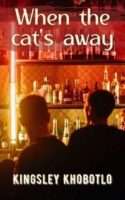What Phumlani doesn’t tell his mother is that upon returning to Freedom Square for the second time, he found Uncle Charles doubled over near the entrance, vomiting violently. At first the teenager was paralysed with fear, but he soon realised that Uncle Charles was alone out there and he had to do something.
Phumlani had decided to risk it all for this man who had taught him so much about football and the importance of a good education. He always praised him and his siblings when they did well at school. In fact, it had become a bit of a tradition that if the final term results were good enough, he would take them out for a nice lunch as a reward and small celebration of their achievements. Charles was one of the few men in the community who actually wanted to see them succeed in life.
Phumlani rushed inside, grabbed a dirty glass, rinsing it and filling it at the rusty tap, and offered it to a wincing Uncle Charles, after helping him to lower himself onto a crate. The man had who seemed fine just hours ago, even joking with them about looking like dirty miners, now seemed very poorly.
Charles kept heaving as if he was about to be sick again, sweat pouring down his face as if he was in the grips of a fever.
“What can I do, Malume?” asked an anxious Phumlani. Charles waved his arms about, but the words would not come. Eventually, with great difficulty, he gestured towards the source of the noise and in a hoarse voice simply said, “Velaphi.”
“Must I call uBab’ Velaphi?” the helpless-looking boy replied. Charles did something with his head that appeared to be a nod.
“Okay!” Phumlani shouted with renewed hope. He ran inside, eyes darting about for Velaphi, ignoring the ‘NO UNDER 18s’ sign and disapproving looks.
Velaphi only had to see the panic in Phumlani’s eyes and hear the name “uMalume Charles” to know something was wrong. Without a word, he struggled to his feet and followed the boy outside. Yes, Velaphi had also been having a good time and quenching his thirst with a few cold ones, but one look at his friend and he knew that something was not right.
He rushed back inside and returned with a jug of water, saying, “Here, drink this, my friend,” and offered Charles some tablets. Half the water ran down Charles’s shirt. Velaphi pulled out a handkerchief, the kind that Phumlani had seen some grannies use to wipe their noses when sniffing snuff, and drenched it in cold water. He then dabbed his unappreciative, protesting friend’s face. He unbuttoned Charles’s shirt slightly and stood back to give him some air.
With a hand on the boy’s shoulder, Velaphi said, “It’s late my boy, and this is no place for children. You did the right thing by calling me, but it’s time for you to go home.” The boy’s eyes lingered on Charles, who was looking a bit better and had stopped vomiting, though the putrid smell lingered in the air.
“I’m fine,” Charles said with a weak smile. “Run along home. Velaphi will drag me home by the ears, if necessary. We’ll be right behind you,” he encouraged.
“If he gets stubborn I’ll throw him in a wheelbarrow,” Velaphi added. They all laughed uncomfortably.
Now, as Phumlani lies in bed next to a snoring Lindokuhle, staring at the bare corrugated iron roof, he wonders if indeed Uncles Charles’s friends value his life as much as he does. Will they bring him home as they promised? Or were they simply prepared to say anything to get rid of the nagging boy so that they could resume their drinking?
“Surely they can’t be that heartless,” Phumlani mumbles to himself.
***
Tell us: Will Charles’s friends bring him home?


